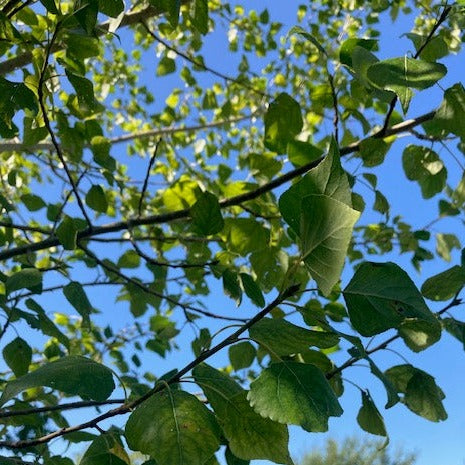Habitat Aid Ltd
Black Poplar (Populus nigra)
Black Poplar (Populus nigra)
Prices include VAT (when applicable) and delivery to mainland UK.
Couldn't load pickup availability
Black Poplar (Populus nigra, subspecies betulifolia)
Don't confuse the Black Poplar with poplar hybrids or the European subspecies. Richard Mabey, in his Flora Britannica, estimated there are only 4-6,000 of these long living trees left in the country, largely as a consequence of land reclamation and drainage an hybridisation. That's probably on the low side; more scienitific recent analysis suggests around 7,000. Drainage schemes and the introduction of faster growing hybrids mean that Black poplars are now very rare indeed, with our remaining natural population centred around Aylesbury Vale (where the growers who we source them from is). In Sussex there are said to be only 33 left, for example. There are so few in the countryside now that the only naturally occurring new plants are hybrids from other poplar species.
Populus nigra are very fast growing landmark trees that need the wet. The Black poplar (why "black" no-one knows) has an invasive root system, but its spreading habit means it typically leans over if left unpollarded. They not only need damp conditions to regenerate, but male and female trees also need to be close to each other. Male Black Poplars have red catkins in Spring, known in some parts as "Devil's fingers", whereas the female flowers are yellow-green. They're wind pollinated, but foodplants to several moths.
Uses
The trees were much prized in the 17th and 18th centuries for their wood, which is fire resistant and was used around fireplaces. Its open grain meant it could absorb paraffin wax and so its was used for matches, while its springiness and tendency not to splinter also meant Black Poplar wood was used for cartmaking. Unlike many poplar hybrids it's relatively slow growing, so in recent times has fallen out of favour as a tree grown for wood production.
Our Plants For Sale

Supplier : Lindengate
Prices include VAT and delivery to mainland UK
We offer Black Poplar as 40-60cm plants in pots, as a multiple of 3.
If you do not plant your Black Poplar plants on receipt, they should be unwrapped, soaked in cold water for 10-15 minutes and left in their pots.
Share





